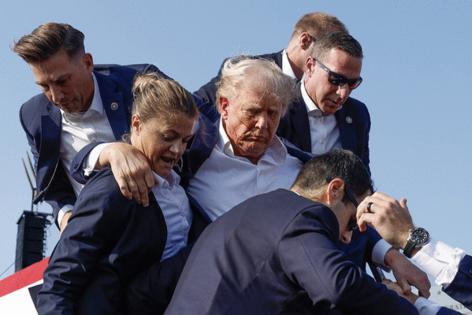Commentary: Trump assassination attempt will fuel political extremism
Published in Op Eds
President Joe Biden’s initial response to the attack on Donald Trump, calling it “sick” and reaching out to his stricken adversary to express support, was commendable. Statements from other prominent Democrats, including former President Barack Obama and Vice President Kamala Harris, as well as notable Republicans like former President George W. Bush and Senate Minority Leader Mitch McConnell, echoed this sentiment of unity and concern.
In contrast, the response from some on the right — engaging in finger-pointing and blaming Democrats for their heated rhetoric — proved less productive. Vice presidential candidate J.D. Vance, for instance, asserted that Biden's campaign rhetoric "led directly to President Trump's attempted assassination," seemingly in reaction to recent comments from Biden suggesting, "It’s time to put Trump in a bullseye." This divisive rhetoric only exacerbates the political tension that already grips the nation. Instead of fostering unity, such accusations deepen the partisan divide.
Many hoped that Trump and his followers wouldn’t exploit this assassination attempt to blame Democrats for political violence in America, but social media is already aflame with such memes. Republican efforts now seem directed at getting the media to condemn Democrats whenever they highlight the GOP's association with violence.
From Jan. 6 to Trump's jokes about the hammer attack on Paul Pelosi to his "very fine people" comment in Charlottesville, the pattern is clear. Having secured the fervent support of the GOP base in the wake of this attempt on his life, his new aim might be to attract swing voters by sounding reasonable. Such a strategy could also aid the GOP in countering Biden's critiques of Trump’s decade-long promotion of violence.
However, the question remains: Will the media join in condemning Democrats for normal campaign rhetoric while normalizing Trump's violent past? And will Biden and his campaign, along with progressive media, be silenced by the GOP's phony calls to "tone down the rhetoric"? The stakes in this political theater are high, and the fallout will shape the nation’s discourse.
The challenge lies in whether Biden and progressive media will bow to GOP pressure to temper their campaign rhetoric while Trump’s own history of incendiary language is normalized. The ongoing focus on Trump, with all its implications, highlights his extremism, legal issues and the far-right agenda outlined in Project 2025, a policy blueprint he has struggled to distance himself from. Democrats hope that this scrutiny might sway swing voters away from him.
The attempt on Trump's life reinforces his self-portrayal as a victim, a narrative he has cultivated since his 2020 re-election loss. He has consistently framed his legal battles as partisan attacks and even suggested that the 2022 FBI raid on Mar-a-Lago was a covert assassination attempt.
Trump’s base remains fiercely reactive to any perceived threats against him. Following his May conviction on felony charges in New York, his supporters called for violence against jurors and judges, and even riots. Similarly, at a recent rally, journalists reported aggressive behavior from Trump’s supporters, including threats, taunts and attempts to breach the media area. This volatile reaction underscores the dangerous climate surrounding Trump, where every incident is amplified into a political weapon, further fueling divisions in American politics.
Trump's reliance on conspiracy theories and divisive rhetoric has been a hallmark of his political strategy. However, in the wake of the recent shooting, it remains uncertain whether he will deter his base from such inflammatory tactics. This incident presents Trump with a crucial opportunity to prioritize national peace and security over personal ambition. A near-death experience might compel a shift in his approach, urging him to foster a more measured tone.
The potential consequences of Trump's response are significant. If he continues to incite his supporters, the nation could face increasingly dangerous repercussions. We've already witnessed the destructive impact of his rhetoric, as seen with the Jan. 6, 2021, Capitol riot driven by fabricated claims of victimization. The recent shooting could herald a period of heightened peril if Trump does not moderate his influence. His reaction will be pivotal in determining whether this troubling trend towards political violence will escalate further or be curtailed.
The proliferation of conspiracy theories and apocalyptic rhetoric on the right has significantly contributed to the rise in violent acts. The attempted assassination could further inflame the radicalism that has been brewing. Saturday’s shooting was a close call with tragedy, narrowly avoiding what could have been one of the darkest days in American history. This incident marks a critical inflection point in the presidential race and the broader political climate.
It is highly likely that Trump will seize the recent assassination attempt as a prime political opportunity rather than a moment for genuine reflection. Instead of introspection, Trump will likely indulge his deep-seated self-image, turning to his own brand of heroism rather than any spiritual or moral reconsideration. Rather than seeking solace in religious texts, he may instead look to his persona as a larger-than-life figure, impervious to bullets and criticism alike.
Trump’s response is expected to exacerbate his existing rhetoric, doubling down on divisive narratives and conspiracies. By pandering to his evangelical base, he is poised to frame the attack as a testament to his divine protection, portraying himself as a heroic savior against alleged Democratic enemies. This manipulation of religious symbolism to bolster his position will only deepen the polarization within American politics.
His supporters will rally around this constructed martyrdom, elevating him to a mythic status that aligns with his grandiose self-image, while his advisors work to fine-tune this narrative to maximize political gain. This approach highlights a troubling trend of exploiting personal crises for political leverage.
_____
Khalid is a physician, geostrategic analyst and freelance writer.
_____
©2024 The Fulcrum. Visit at thefulcrum.us. Distributed by Tribune Content Agency, LLC.




























































Comments